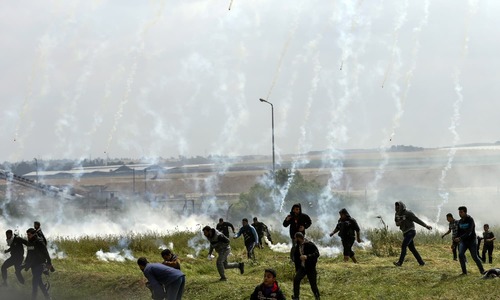Gazans buried their dead on Saturday with calls for “revenge” a day after a mass protest led to clashes that saw Israeli forces kill 16 Palestinians in the bloodiest day since a 2014 war.
The angry funeral scenes came as the United States blocked a draft UN Security Council statement urging restraint and calling for an investigation into the clashes.
Only several hundred protesters returned to tents erected at sites near the Gaza Strip's border with Israel to resume demonstrations planned to last six weeks in the blockaded enclave.
On the diplomatic front, UN chief Antonio Guterres and European Union diplomatic chief Federica Mogherini called for an “independent and transparent investigation” into Israel's use of live ammunition.
But a motion put forward before the UN Security Council by Kuwait late Saturday calling for such a move was rejected by the United States, a Security Council diplomat told AFP.
Israel defended the army fire at Palestinians who broke away from the main protest of tens of thousands and neared the heavily fortified fence around the Gaza Strip.
“Well done to our soldiers,” Prime Minister Benjamin Netanyahu wrote in a statement Saturday.
“Israel acts vigorously and with determination to protect its sovereignty and the security of its citizens.”
An Israeli military spokesman said Friday's events were “not a protest demonstration” but “organised terrorist activity” by Hamas, which has fought three wars with Israel since 2008.
“If it continues, we shall have no choice but to respond inside the Gaza Strip against terrorist targets which we understand to be behind these events,” said Brigadier General Ronen Manelis.
Gaza's health ministry said 35 people suffered wounds that were not life-threatening in low-level clashes along the border on Saturday.
Thousands attended funerals for 14 of those killed — two were buried on Friday — with mourners holding Palestinian flags and some chanting “revenge” and firing into the air.
Pressure for inquiry
The armed wing of Hamas, the Islamist movement that runs the Gaza Strip, said five of those killed were its members who were participating “in popular events side-by-side with their people.”
The Israeli army said in a statement Saturday night that 10 of the dead had “documented terror backgrounds” in Hamas and other groups and were killed “whilst carrying out acts of terror.”
In addition to the 16 Palestinians killed, more than 1,400 were wounded Friday, 758 of them by live fire, with the remainder hurt by rubber bullets and tear gas inhalation, according to the health ministry in Gaza.
The Israeli military says its forces opened fire only when necessary against those throwing stones and firebombs or rolling tyres at soldiers.
It said there were attempts to damage the fence and break through into Israel, as well as an attempted gun attack against troops.
No casualties were reported among Israelis.
Palestinians accused Israel of using disproportionate force, saying its soldiers opened fire on protesters who did not pose a threat, while human rights groups questioned Israel's use of live fire.
Israeli Defence Minister Avigdor Lieberman issued a scornful rejection of demands for a probe.
“I do not understand the chorus of hypocrites who want a commission of inquiry,” he posted in Hebrew on his Twitter account.
“They got confused and thought Hamas organised a Woodstock Festival yesterday and that we should give them flowers.” Palestinian president Mahmud Abbas declared Saturday a day of national mourning and in a speech said he held Israel fully responsible for the deaths.
US 'cover for Israel'
The six-week protest is in support of Palestinian refugees and the timetable holds significance for a range of reasons that have added to tensions.
It began on Land Day, when Palestinians commemorate the killing of six unarmed Arab protesters in Israel in 1976.
Protests will continue until the United States opens its new Jerusalem embassy around May 14, a move that has enraged Palestinians, who see the city's annexed eastern sector as the capital of their future state.
May 14 will also mark 70 years since the creation of Israel, while Palestinians will mark what they call the Nakba, or “catastrophe,” the following day.
The Nakba commemorates the more than 700,000 Palestinians who either fled or were expelled from their homes in the war surrounding Israel's creation in 1948.
US President Donald Trump has harshly criticised the Palestinians in the past, but the State Department said only that it was “deeply saddened” by the loss of life and urged steps to lower tensions.
Human Rights Watch called calling the number of killed and wounded “shocking”.
“Israeli allegations of violence by some protesters do not change the fact that using lethal force is banned by international law except to meet an imminent threat to life,” the New York-based group said.
Israel had deployed troop reinforcements along the border, including more than 100 special forces snipers, saying it would prevent attempts to break through the fence.
Protests along the border are common, often involving young Palestinian men throwing stones at Israeli soldiers who respond with tear gas along with rubber and live bullets.
But the “March of Return” protest that began on Friday is on a larger scale and intended to involve families with women and children camping in tent cities near the border for weeks.
Israel says it only shot at protesters charging Gaza border
Israel's defence minister says troops acted appropriately by only firing on Palestinian protesters who charged toward Gaza's border with Israel.
Avigdor Lieberman said on Sunday that those who protested peacefully were not harmed, and he rejected accusations of excessive use of force in the mass protests Friday in which 15 Palestinians were killed. It was the area's deadliest violence in four years.
Israel says thousands of Palestinians approached the border, with hundreds engaged in acts of violence ranging from rock-throwing to hurling firebombs to opening fire at Israeli troops guarding the border.













































